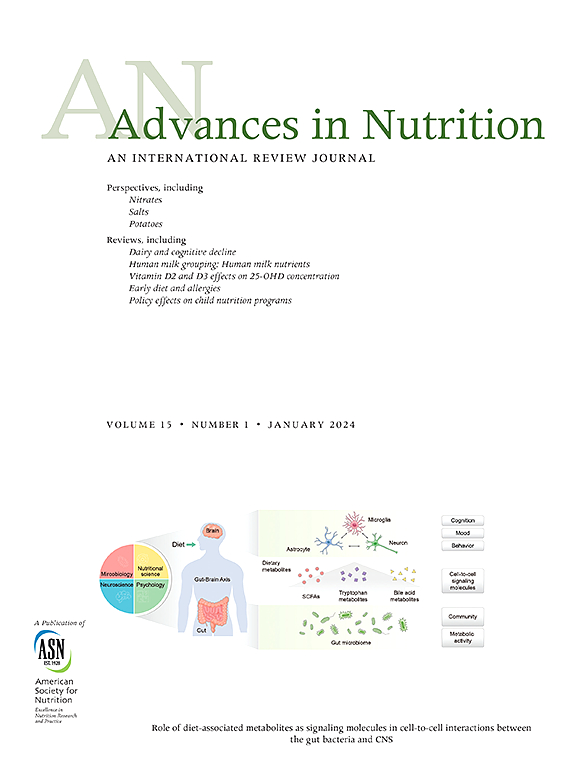Addressing the Urgent Need for Clinical Nutrition Education in PostGraduate Medical Training: New Programs and Credentialing
IF 8
1区 医学
Q1 NUTRITION & DIETETICS
引用次数: 0
Abstract
The importance of nutrition in the development of disease, and in the recovery from illness, is among the most fundamental tenets in human biology and optimal health. Nutrition was fundamental in many traditional forms of medicine until its role in medical care experienced a rapid decline over the last century. We believe a key cause of the decline in nutrition's essential role in healthcare and preventative medicine is the escalating crisis of inadequate nutrition education in medical training. Recent data show 75% of United States medical schools have no required clinical nutrition classes and only 14% of residency programs have a required nutrition curriculum. More troubling, only 14% of current healthcare providers feel comfortable discussing nutrition with their patients. The purpose of this paper is to present the evidence illustrating the distinct lack of nutrition education in medical training. Further, we present key examples of existing formal nutrition curricula to incorporate nutritional science into all healthcare providers’ education and practices. We discuss existing nutrition fellowships and training programs, including the new Duke Online Clinical Nutrition Fellowship. We also cover a physician nutrition certification allowing physicians to pursue clinical nutrition as a career path. Finally, recent financial incentives and quality measures incentivizing healthcare provider nutrition education is discussed. Thus, in conclusion, we advocate the inclusion of nutrition education curricula as a priority in medical schools, graduate medical education, and continuing medical education. Formal clinical nutrition training should be a requirement for hospital leadership and administrators for all Parenteral Nutrition and Nutrition Team Physician Directors in hospitals worldwide, and this key clinical role must become an essential position in all hospitals. In addition, we immediately need to address the critical shortage of physician nutrition specialists who will serve as the next generation of leaders in clinical nutrition care and research.
满足医学研究生培训对临床营养教育的迫切需求:新课程和资格认证。
营养在疾病发生和康复中的重要性是人类生物学和最佳健康的最基本原则之一。营养是许多传统医学的基础,直到上个世纪营养在医疗保健中的作用急剧下降。我们认为,营养在医疗保健和预防医学中的重要作用下降的一个关键原因是医学培训中营养教育不足的危机不断升级。最新数据显示,75% 的美国医学院没有开设必修的临床营养课程,只有 14% 的住院医师培训项目开设了必修的营养课程。更令人担忧的是,目前只有 14% 的医疗服务提供者愿意与病人讨论营养问题。本文旨在提供证据,说明医学培训中明显缺乏营养教育。此外,我们还将介绍现有正规营养课程的主要实例,以便将营养科学纳入所有医疗服务提供者的教育和实践中。我们将讨论现有的营养奖学金和培训计划,包括新的杜克大学在线临床营养奖学金。我们还将介绍允许医生将临床营养作为职业发展方向的医生营养认证。最后,我们还将讨论近期激励医疗服务提供者开展营养教育的财政激励措施和质量措施。因此,总而言之,我们主张必须将营养教育课程列为医学院、医学研究生教育和继续医学教育的优先事项。医院领导和管理者应要求全球所有医院的肠外营养和营养团队医师主任接受正规的临床营养培训,而且这一关键的临床角色必须成为所有医院的重要职位。此外,我们亟需解决营养专科医生严重短缺的问题,他们将成为下一代临床营养护理和研究领域的领军人物。
本文章由计算机程序翻译,如有差异,请以英文原文为准。
求助全文
约1分钟内获得全文
求助全文
来源期刊

Advances in Nutrition
医学-营养学
CiteScore
17.40
自引率
2.20%
发文量
117
审稿时长
56 days
期刊介绍:
Advances in Nutrition (AN/Adv Nutr) publishes focused reviews on pivotal findings and recent research across all domains relevant to nutritional scientists and biomedical researchers. This encompasses nutrition-related research spanning biochemical, molecular, and genetic studies using experimental animal models, domestic animals, and human subjects. The journal also emphasizes clinical nutrition, epidemiology and public health, and nutrition education. Review articles concentrate on recent progress rather than broad historical developments.
In addition to review articles, AN includes Perspectives, Letters to the Editor, and supplements. Supplement proposals require pre-approval by the editor before submission. The journal features reports and position papers from the American Society for Nutrition, summaries of major government and foundation reports, and Nutrient Information briefs providing crucial details about dietary requirements, food sources, deficiencies, and other essential nutrient information. All submissions with scientific content undergo peer review by the Editors or their designees prior to acceptance for publication.
 求助内容:
求助内容: 应助结果提醒方式:
应助结果提醒方式:


